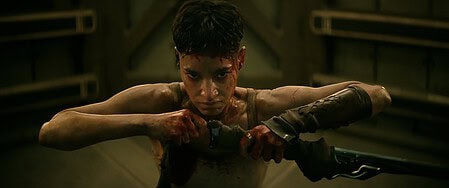Last night at the Oscars, Will Smith walked onto the stage during Chris Rock’s monologue and hit him in the face. The event was remarkably well-documented, dominating not only the world’s airwaves but the ensuing social media feeds. It literally defines what can be viral on social media.
Smith left his seat to approach and strike Rock on stage after the presenter made a “joke” about his wife, Jada Pinkett-Smith, alluding to the fact that she has alopecia, a medical condition that results in hair loss. After what he did, Smith was permitted by the Oscars to remain at the event, even though they claimed not to condone violence.
The question that millions of people are asking this morning is whether Will Smith’s actions legally constituted assault and battery.
David Gelman, a criminal defense lawyer, explains that laws governing assault and battery are state rather than federal laws:
“Each state has laws governing assault and battery, which are generally treated as separate crimes. It’s easy for us to look at an act and feel that it might be assault, battery, or both, but it’s completely dependent upon the definition of the crime in the state in which the act took place.”
While the Oscars are broadcast to a massive audience around the world, they are held in California. In California, assault and battery are, by statute, two different crimes. California Penal Code 240 PC deals with assault, while California Penal Code 242 PC deals with battery.
It’ is clear that what happened at the Oscars was an assault under the California statutory definition:
“An assault is an unlawful attempt, coupled with a present ability, to commit a violent injury on the person of another.”
When WIll Smith left his seat in response to Chris Rock’s comment about Jada Pinkett-Smith, walked up to the stage, and approached him, he had the ability to commit a violent injury. This in itself is an assault. Legally, the assault is not predicated upon a successful commission of another act, such as striking the other person. Simply a threatening act or statement that causes another person to believe that they are about to be attacked constitutes an assault in California.
A spokesperson for the LAPD has responded to the incident between Will Smith and Chris Rock saying
“We don’t have any details about the incident. As soon as we do, we will make them available to the public,"
(@Variety) pic.twitter.com/HGNjGHnish
— Geek Vibes Nation (@GeekVibesNation) March 28, 2022
Assault under California Penal Code 240 PC, known as “simple assault” is a misdemeanor, punishable by a fine of up to $1,000 and/or up to six months in county jail.
What happened at the Oscars also clearly fits the California statutory definition of battery:
“A battery is any willful and unlawful use of force or violence upon the person of another.”
When WIll Smith left his seat in response to Chris Rock’s comment about Jada Pinkett-Smith, walked up to the stage, and approached him, he had the ability to commit a violent injury. When Will Smith actually hit Chris Rock (whether it was a strong open-handed slap or a closed first punch doesn’t matter at all according to the law) he absolutely committed (an extremely well-documented) battery under California law.
Battery under California Penal Code 242 PC is a misdemeanor, punishable by a fine of up to $2,000 and/or up to six months in county jail.
The only thing that is legally uncertain is which battery statute is relevant here. While California Penal Code 242 PC generally deals with battery, where a battery is committed and it results in a significant or serious injury, the charge is far more serious and is covered by California Penal Code 243(d) PC:
“When a battery is committed against any person and serious bodily injury is inflicted on the person, the battery is punishable by imprisonment in a county jail not exceeding one year or imprisonment pursuant to subdivision (h) of Section 1170 for two, three, or four years.”
While Chris Rock chose to hold himself together and go on with the show, we don’t know whether he sustained any physical injuries. Not only could he have sustained a facial or jaw injury, we also don’t know what medical conditions he has that could have been exacerbated when he was struck in the face. Perhaps he has headaches today and the full physical effect of the battery takes days to measure. This is why the statue delineates between less and more severe battery charges.
What was truly remarkable about what happened at the Oscars is that Will Smith wasn’t arrested. In a statement by the LAPD, Will Smith was not arrested because Chris Rock is choosing at the moment not to press charges.
Of course, this could absolutely change, and if it does, there is also the remote possibility of what happened at the Oscars being treated as what’s known as a “wobbler” – an offense that wobbles between being a misdemeanor and a felony. The prosecutor in an assault and battery case has some leeway into how they want to charge. In a case such as this, with such a public assault and battery, while it is more than likely to be charged as a misdemeanor, who knows what legal perspective a zealous prosecutor might take.
There is also the possibility here for a civil claim, as a civil matter is completely different from a criminal matter. Under California Code of Civil Procedure section 335.1, the victim of an assault and battery has two years from the date of the intentional act to file a civil lawsuit.
There are many reasons why Chris Rock might at some point choose to file a civil claim. Perhaps the battery will leave him with some kind of lasting physical or even reputational injury. Perhaps, upon reflection and considering public outcry, he decides that filing a civil suit is a good way to get the issue of how unacceptable violence is further into the public spotlight. Regardless of the reason for filing a claim – and even if Chris Rock ultimately chooses not to file criminal charges – the clock has begun to tick on the two years he has to file a civil suit in response to an assault and battery that was seen in real time around the world.

Aron Solomon, JD, is the Chief Legal Analyst for Esquire Digital and the Editor of Today’s Esquire. He has taught entrepreneurship at McGill University and the University of Pennsylvania, and was elected to Fastcase 50, recognizing the top 50 legal innovators in the world. Aron has been featured in CBS News, USA Today, ESPN, TechCrunch, The Hill, BuzzFeed, Fortune, Venture Beat, The Independent, Yahoo!, ABA Journal, Law.com, The Boston Globe, and many other leading publications.







